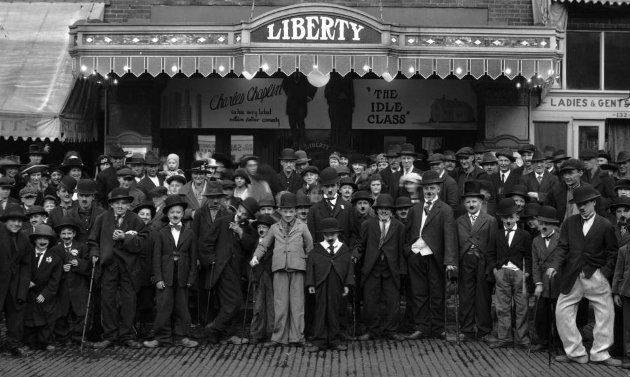Charlie Chaplin started appearing in his first films in 1914---40 films, to be precise---and, by 1915, the United States had a major case of "Chaplinitis." Chaplin mustaches were suddenly popping up everywhere--as were Chaplin imitators and Chaplin look-alike contests. A young Bob Hope apparently won one such contest in Cleveland. Chaplin Fever continued burning hot through 1921, the year when the Chaplin look-alike contest, shown above, was held outside the Liberty Theatre in Bellingham, Washington.
According to legend, somewhere between 1915 and 1921, Chaplin decided to enter a Chaplin look-alike contest, and lost, badly.
A short article called "How Charlie Chaplin Failed," appearing in The Straits Times of Singapore in August of 1920, read like this:
Lord Desborough, presiding at a dinner of the Anglo-Saxon club told a story which will have an enduring life. It comes from Miss Mary Pickford who told it to Lady Desborough, “Charlie Chaplin was one day at a fair in the United States, where a principal attraction was a competition as to who could best imitate the Charlie Chaplin walk. The real Charlie Chaplin thought there might be a chance for him so he entered for the performance, minus his celebrated moustache and his boots. He was a frightful failure and came in twentieth.
A variation on the same story appeared in a New Zealand newspaper, the Poverty Bay Herald, again in 1920. As did another story in the Australian newspaper, the Albany Advertiser, in March, 1921.
A competition in Charlie Chaplin impersonations was held in California recently. There was something like 40 competitors, and Charlie Chaplin, as a joke, entered the contest under an assumed name. He impersonated his well known film self. But he did not win; he was 27th in the competition.
Did Chaplin come in 20th place? 27th place? Did he enter a contest at all? It's fun to imagine that he did. But, a century later, many consider the story the stuff of urban legend. When one researcher asked the Association Chaplin to weigh in, they apparently had this to say: "This anecdote told by Lord Desborough, whoever he may have been, was quite widely reported in the British press at the time. There are no other references to such a competition in any other press clipping albums that I have seen so I can only assume that this is the source of that rumour, urban myth, whatever it is. However, it may be true."
I'd like to believe it is.
Note: An earlier version of this post appeared on our site in 2016.
Related Content:
65 Free Charlie Chaplin Films Online
Charlie Chaplin Does Cocaine and Saves the Day in Modern Times (1936)
When Charlie Chaplin Entered a Chaplin Look-Alike Contest & Came in 20th Place is a post from: Open Culture. Follow us on Facebook, Twitter, and Google Plus, or get our Daily Email. And don't miss our big collections of Free Online Courses, Free Online Movies, Free eBooks, Free Audio Books, Free Foreign Language Lessons, and MOOCs.
from Open Culture https://ift.tt/2XqqlxU
via Ilumina

Comments
Post a Comment